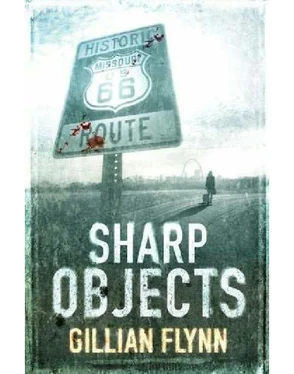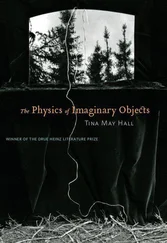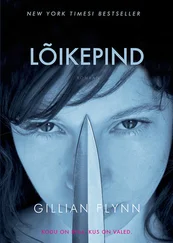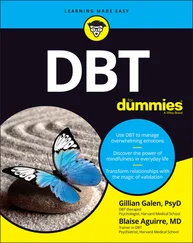Flynn, Gillian - Sharp_Objects
Здесь есть возможность читать онлайн «Flynn, Gillian - Sharp_Objects» весь текст электронной книги совершенно бесплатно (целиком полную версию без сокращений). В некоторых случаях можно слушать аудио, скачать через торрент в формате fb2 и присутствует краткое содержание. Жанр: Старинная литература, на русском языке. Описание произведения, (предисловие) а так же отзывы посетителей доступны на портале библиотеки ЛибКат.
- Название:Sharp_Objects
- Автор:
- Жанр:
- Год:неизвестен
- ISBN:нет данных
- Рейтинг книги:5 / 5. Голосов: 1
-
Избранное:Добавить в избранное
- Отзывы:
-
Ваша оценка:
- 100
- 1
- 2
- 3
- 4
- 5
Sharp_Objects: краткое содержание, описание и аннотация
Предлагаем к чтению аннотацию, описание, краткое содержание или предисловие (зависит от того, что написал сам автор книги «Sharp_Objects»). Если вы не нашли необходимую информацию о книге — напишите в комментариях, мы постараемся отыскать её.
Sharp_Objects — читать онлайн бесплатно полную книгу (весь текст) целиком
Ниже представлен текст книги, разбитый по страницам. Система сохранения места последней прочитанной страницы, позволяет с удобством читать онлайн бесплатно книгу «Sharp_Objects», без необходимости каждый раз заново искать на чём Вы остановились. Поставьте закладку, и сможете в любой момент перейти на страницу, на которой закончили чтение.
Интервал:
Закладка:
She never even told me how she’d met Alan. What I know of their story has come from other people. Questions are discouraged, considered prying. I remember the shock of hearing my college roommate talk to her mother on the phone: The detailed minutia, her lack of censorship seemed decadent. She would say silly things, like how she forgot she’d enrolled for a class—completely forgot she was supposed to be in Geography 101 three days a week—and she’d say it in the same boastful tone of a kindergartner with a gold-star crayon drawing.
I remember finally meeting her mom, how she zipped around our suite asking so many questions, knowing already so much about me. She gave Alison a big plastic bag of safety pins that she thought might come in handy, and when they left for lunch, I surprised myself by bursting into tears. The gesture—so random and kind—baffled me. Is this what mothers did, wonder if you might need safety pins? Mine phoned once a month and always asked the same practical questions (grades, classes, upcoming expenses).
As a child, I don’t remember ever telling Adora my favorite color, or what I’d like to name my daughter when I grew up. I don’t think she ever knew my favorite dish, and I certainly never padded down to her room in the early-morning hours, teary from nightmares. I always feel sad for the girl that I was, because it never occurred to me that my mother might comfort me. She has never told me she loved me, and I never assumed she did. She tended to me. She administrated me. Oh, yes, and one time she bought me lotion with vitamin E.
For a while I convinced myself that Adora’s distance was a defense constructed after Marian. But in truth, I think she’s always had more problems with children than she’d ever admit. I think, in fact, she hates them. There’s a jealousy, a resentfulness that I can feel even now, in my memory. At one point, she probably liked the idea of a daughter. When she was a girl, I bet she daydreamed of being a mother, of coddling, of licking her child like a milk-swelled cat. She has that voraciousness about children. She swoops in on them. Even I, in public, was a beloved child. Once her period of mourning for Marian was over, she’d parade me into town, smiling and teasing me, tickling me as she spoke with people on the sidewalks. When we got home, she’d trail off to her room like an unfinished sentence, and I would sit outside with my face pressed against her door and replay the day in my head, searching for clues to what I’d done to displease her.
I have one memory that catches in me like a nasty clump of blood. Marian was dead about two years, and my mother had a cluster of friends come over for afternoon drinks. One of them brought a baby. For hours, the child was cooed over, smothered with red-lipstick kisses, tidied up with tissues, then lipstick smacked again. I was supposed to be reading in my room, but I sat at the top of the stairs watching.
My mother finally was handed the baby, and she cuddled it ferociously. Oh, how wonderful it is to hold a baby again! Adora jiggled it on her knee, walked it around the rooms, whispered to it, and I looked down from above like a spiteful little god, the back of my hand placed against my face, imagining how it felt to be cheek to cheek with my mother.
When the ladies went into the kitchen to help tidy up the dishes, something changed. I remember my mother, alone in the living room, staring at the child almost lasciviously. She pressed her lips hard against the baby’s apple slice of a cheek. Then she opened her mouth just slightly, took a tiny bit of flesh between her teeth, and gave it a little bite.
The baby wailed. The blotch faded as Adora snuggled the child, and told the other women it was just being fussy. I ran to Marian’s room and got under the covers.
Back at Footh’s for a drink after my mother and the Nashes. I was boozing too much, but never to the point of drunkenness, I reasoned with myself. I needed just a nip. I’ve always been partial to the image of liquor as lubrication—a layer of protection from all the sharp thoughts in your head. The barkeep was a round-faced guy two classes behind me who I was pretty sure was named Barry but not sure enough to actually call him that. He muttered, “Welcome back,” as he filled my Big Mouth cup two-thirds full of bourbon, splashed some coke on top. “On the house,” he said to the napkin holder. “We don’t take money from pretty women here.” His neck shot red, and he suddenly pretended he had urgent business at the other end of the counter.
Itook Neeho Drive on the way back to the house. It was a street several of my friends had lived on, slicing through town and growing increasingly more posh as it neared Adora’s. I spotted Katie Lacey’s old home, a flimsy mansion her parents built when we were ten—after they’d smashed their old Victorian into shards.
A block ahead of me, a little girl on a golf cart decorated with flower stickers putt-putted along. She wore her hair in elaborate braids like a little Swiss maid on a cocoa box. Amma. She’d taken advantage of Adora’s visit to the Nashes to make an escape—girls traveling solo were an oddity in Wind Gap since Natalie’s killing.
Rather than continue home, she turned and headed east, which meant dirtbox houses and the pig farm. I turned the corner and followed her so slowly I almost stalled out.
The route offered a nice downhill slope for Amma, and the cart glided so fast her braids flew out behind her. In ten minutes, we were in the country. Tall yellow grasses and bored cows. Barns leaning like old men. I let the car idle for a few minutes to give Amma a good head start, then drove just far enough to keep her in sight. I trailed her past farmhouses and a roadside walnut stand that was manned by a boy who held his cigarette jaunty as a movie star. Soon the air smelled like shit and stale saliva and I knew where we were heading. Another ten minutes and the metal pig holds came into sight, long and glinty like rows of staples. The squeals made my ears sweat. Like screams from a rusty well pump. My nose flared involuntarily and my eyes started watering. You ever been near an animal-processing plant, you know what I mean. The smell isn’t like water or air; it’s a solid. Like you should be able to cut a hole in the stink to get some relief. You can’t.
Amma zipped through the gates of the plant. The guy at the booth just waved at her. I had a tougher time until I said the magic word: Adora.
“Right. Adora’s got a grown-up daughter. I remember,” said the old guy. His nametag said Jose. I tried to see if he was missing any fingers. Mexicans don’t get cushy box jobs unless they’re owed. That’s the way plants down here work: The Mexicans get the shittiest, most dangerous jobs, and the whites still complain.
Amma parked her cart next to a pickup and dusted herself off. Then, with a businesslike beeline, she walked straight past the slaughtering house, past the lines of pig holds, those wet pink snouts squirming between the air slats, and to a big metal barn of a building where the nursing happens. Most sows are repeatedly inseminated, brood after brood, till their bodies give way and they go to slaughter. But while they’re still useful, they’re made to nurse—strapped to their sides in a farrowing crate, legs apart, nipples exposed. Pigs are extremely smart, sociable creatures, and this forced assembly-line intimacy makes the nursing sows want to die. Which, as soon as they dry up, they do.
Even the idea of this practice I find repulsive. But the sight of it actually does something to you, makes you less human. Like watching a rape and saying nothing. I saw Amma at the far end of the barn, standing at the edge of one metal farrowing crate. A few men were pulling one pack of squealing piglets out of the stall, throwing another pack in. I moved to the far side of the barn so I could stand behind Amma without her seeing me. The pig lay nearly comatose on its side, its belly exposed between metal bars, red, bloody nipples pointing out like fingers. One of the men rubbed oil on the goriest one, then flicked it and giggled. They paid no attention to Amma, as if it were quite normal that she was there. She winked at one as they snapped another sow in a crate and drove off to get the next pack.
Читать дальшеИнтервал:
Закладка:
Похожие книги на «Sharp_Objects»
Представляем Вашему вниманию похожие книги на «Sharp_Objects» списком для выбора. Мы отобрали схожую по названию и смыслу литературу в надежде предоставить читателям больше вариантов отыскать новые, интересные, ещё непрочитанные произведения.
Обсуждение, отзывы о книге «Sharp_Objects» и просто собственные мнения читателей. Оставьте ваши комментарии, напишите, что Вы думаете о произведении, его смысле или главных героях. Укажите что конкретно понравилось, а что нет, и почему Вы так считаете.












